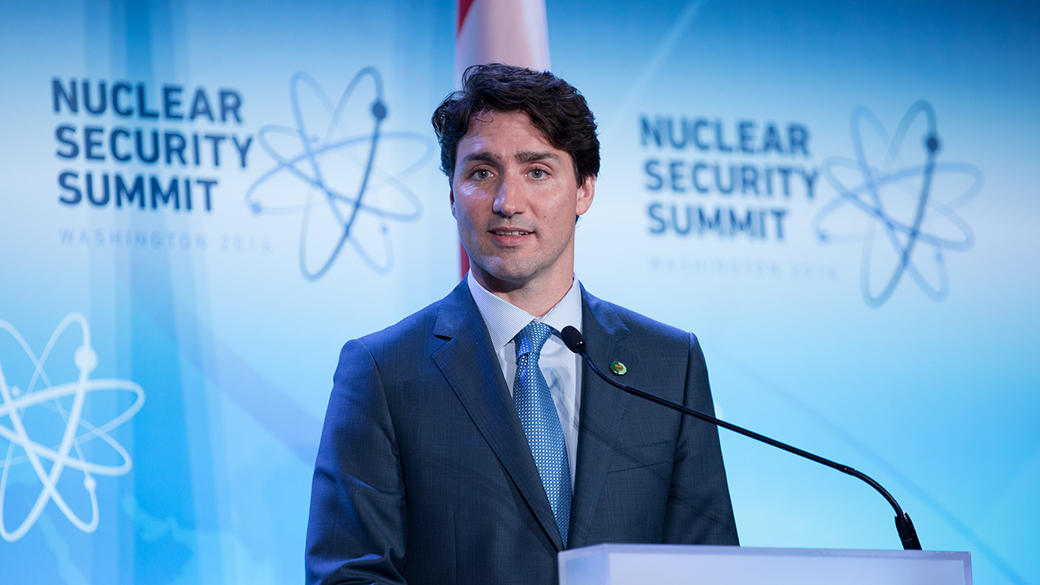
During the 2016 Nuclear Security Summit (NSS) in Washington, D.C., the Prime Minister, Justin Trudeau, announced that Canada is jointly leading for two “gift baskets”: the first, with Spain and the Republic of Korea, aims to achieve the universal implementation of the United Nations Security Council Resolution 1540; the second, with the United Kingdom, supports certified training for nuclear security management.
“Gift baskets” are a mechanism for sub-groups of NSS participants to take action in specific areas. Here are some details about the two gift baskets Canada is co-leading, as well as a run-down on the 15 gift baskets Canada is co-sponsoring.
Gift baskets co-led by Canada
Universal implementation of UN Security Council Resolution 1540 (co-led with Spain and the Republic of Korea)
Contributes to the full and universal implementation of UNSCR 1540, assists efforts in facilitating technical assistance on the implementation of 1540, and contributes to transparency and confidence-building in global nuclear security.
The importance of providing comprehensive training and certification for nuclear security practitioners (co-led with the UK)
Contributes to highlighting the successes of the World Institute for Nuclear Security (WINS) Academy in providing certified training of nuclear security managers and personnel, and encourages the expansion of WINS’ certification program.
Gift baskets co-sponsored by Canada
Sustaining action to strengthen global nuclear security (co-sponsored with the US)
Creates a US-led “Nuclear Security Contact Group” as a post-2016 coordinating mechanism that will assess gaps in the implementation of NSS commitments, identify emerging threats/issues, and reduce duplication of efforts.
Countering nuclear smuggling (co-sponsored with Jordan)
Outlines steps for states to investigate nuclear smugglers, detect and recover nuclear and other radioactive material out of regulatory control, and prosecute criminals.
Nuclear Security Support Centers (co-sponsored with Italy)
Further implements and enhances the sustainability of Nuclear Security Support Centers (NSSC) and their Centres of Excellence through: strengthening the IAEA network; establishing regional networks; and, improving NSSC quality.
Nuclear detection (co-sponsored with Finland)
Assists states in building national capacities for nuclear detection, consistent with Canada’s current border detection practices.
Insider threats (co-sponsored with the US)
Establishes a comprehensive graded approach to addressing insider threats at nuclear facilities, with both national and international steps.
Low-enriched uranium (LEU) fuel banks (co-sponsoring with Kazakhstan)
Joint Statement by states supporting the establishment of the IAEA LEU Fuel Bank (Canada is a Member State of this IAEA initiative).
Transport security (co-sponsored with Japan)
Endorses best practices guides developed by NSS states for transport modes (air, maritime, rail, and road), two of which Canada helped develop (air, and road).
Preparedness and response (co-sponsored with the Republic of Korea)
Supports enhanced nuclear terrorism preparedness/response capabilities by building on national capacities, and enhancing international cooperation and assistance.
Consolidated reporting/info sharing (co-sponsored with the Netherlands)
Supports a consolidated reporting mechanism for non-sensitive information that aims to alleviate pressures associated with duplicative reporting.
Nuclear forensics (co-sponsored with Australia)
Contains broad areas for states to build national capacities for nuclear forensics, and is consistent with Canada’s current nuclear forensics capabilities.
Cyber security: industrial control systems (co-sponsored with the UK)
Increases cyber security of industrial control and plant systems at nuclear facilities, as a central element of the international community’s response to this evolving threat.
Maritime supply chain security (co-sponsored with the UK)
Outlines "best practices" that were discussed at a 16-18 November 2015 workshop at Wilton Park, UK. These practices focus on technical areas to enhance security of nuclear materials being transported via marine shipping.
High activity sealed radioactive sources (HASS) (co-sponsored with France)
Supports actions that strengthen the security of HASS through improving whole-of-life management of HASS, and exploring alternative non-HASS technologies.
HEU minimization and elimination in civilian uses (co-sponsored with Norway)
Supports action to minimize highly-enriched uranium (HEU)–with a view to eventual elimination–in civilian applications, such as its use as fuel for research reactors, and HEU-based production of medical isotopes.
Statement by the Global Partnership (co-sponsored with Japan)
Highlights support by the 31-member Global Partnership in supporting the goals and commitments of the NSS process and the intention to continue efforts to prevent non-state actors from acquiring weapons of mass destruction.
A complete description of these NSS gift baskets will be posted on the 2016 NSS website: Nuclear Security Summit

